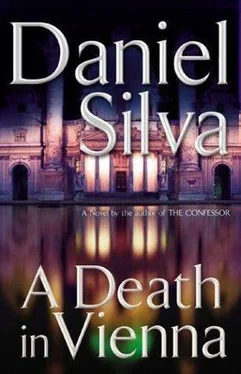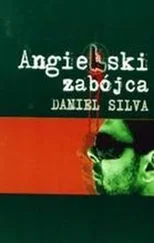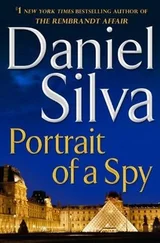GABRIEL CROUCHED AND, brushing away a layer of powdery dust, examined the face. Evidently it had been taken some years before his death, because the man it depicted was middle-aged, perhaps in his late forties. Gabriel was certain of only one thing. It was not the face of Erich Radek.
“I assume it’s not your uncle, Monsieur Duran?”
“Are you certain the photograph is of him?”
“Yes, of course. I found it myself, in a strongbox containing a few of his private things.”
“I don’t suppose you’d allow me to see his things?”
“I no longer have them. And even if I did-”
Father Morales, leaving the thought unfinished, handed Gabriel the flashlight. “I’ll leave you alone now. I can find my way without the light. If you would be so kind as to leave it at the rectory door on your way out. It was a pleasure meeting you, Monsieur Duran.”
With that, he turned and vanished among the gravestones.
Gabriel looked up at Chiara. “It should be Radek’s picture. Radek went to Rome and obtained a Red Cross passport in the name of Otto Krebs. Krebs went to Damascus in 1948, then emigrated to Argentina in 1963. Krebs registered with the Argentine police in this district. Thisshould be Radek.”
“Meaning?”
“Someone else went to Rome posing as Radek.” Gabriel pointed at the photograph on the gravestone. “It was this man. This is the Austrian who went to the Anima seeking help from Bishop Hudal. Radek was somewhere else, probably still hiding in Europe. Why else would he go to such lengths? He wanted people to believe he was long gone. And in the event someone ever went looking for him, they would follow the trail from Rome to Damascus to Argentina and then find the wrong man-Otto Krebs, a lowly hotel worker who’d scraped together enough money to buy a few acres along the Chilean border.”
“You still have one major problem,” Chiara said. “You can’t prove Ludwig Vogel is really Erich Radek.”
“One step at a time,” Gabriel said. “Making a man disappear is not so simple. Radek would have needed help. Someone else has to know about this.”
“Yes, but is he still alive?”
Gabriel stood and looked in the direction of the church. The bell tower appeared in silhouette. Then he noticed a figure walking toward them through the gravestones. For a moment he thought it was Father Morales; then, as the figure drew nearer, he could see that it was a different man. The priest was thin and small. This man was squat and powerfully built, with a quick, rolling gait that propelled him smoothly down the hill among the grave markers.
Gabriel raised the flashlight and shone it toward him. He glimpsed the face briefly before the man shielded it behind a large hand: bald, bespectacled, thick eyebrows of gray and black.
Gabriel heard a noise behind him. He turned and shone the flashlight toward the woods along the perimeter of the cemetery. Two men in dark clothing were coming out of the trees at a run, compact submachine guns in their hands.
Gabriel trained the beam once again on the man coming down through the headstones and saw that he was drawing a weapon from the inside of his jacket. Then, suddenly, the gunman stopped walking. His eyes were fixed not on Gabriel and Chiara but on the two men coming out of the trees. He stood motionless for no more than a second-then abruptly he put the gun away, turned, and ran in the other direction.
By the time Gabriel turned again, the two men with the submachine guns were a few feet away and coming hard on the run. The first collided with Gabriel, driving him down into the hard soil of the graveyard. Chiara managed to shield her face as the second gunman knocked her to the ground, too. Gabriel felt a gloved hand clamp across his mouth, then the hot breath of his attacker in his ear.
“Relax, Allon, you’re among friends.” He spoke English with an American accent. “Don’t make this difficult for us.”
Gabriel pulled the hand off his mouth and looked into his attacker’s eyes. “Who are you?”
“Think of us as your guardian angels. That man walking toward you was a professional assassin, and he was about to kill you both.”
“And what are you going to do with us?”
The gunmen pulled Gabriel and Chiara to their feet and led them out of the cemetery into the trees.
PART THREE. THE RIVER OF ASHES
27 PUERTO BLEST, ARGENTINA
THE FOREST FELL away sharply from the edge of the cemetery into the void of a blackened ravine. They clambered down the steep slope, picking their way through the trees. The evening was moonless, the darkness absolute. They walked single file, one American in front, followed by Gabriel and Chiara, another American at the back. The Americans wore night-vision goggles. They moved, in Gabriel’s opinion, like elite soldiers.
They came to a small, well-concealed encampment: black tent, black sleeping bags, no sign of a fire or stove for cooking. Gabriel wondered how long they’d been here, watching the cemetery. Not long, judging from the growth on their cheeks. Forty-eight hours, maybe less.
The Americans started packing up. Gabriel tried for a second time to determine who they were and whom they worked for. He was met by weary smiles and stony silence.
It took them a matter of minutes to break down the camp and obliterate any last trace of their presence. Gabriel volunteered to shoulder one of the packs. The Americans refused.
They started walking again. Ten minutes later, they were standing at the bottom of the ravine in a rocky streambed. A vehicle awaited them, concealed beneath a camouflage tarpaulin and pine branches. It was an old Rover with a spare tire mounted on the hood and jerry cans of extra fuel on the back.
The Americans chose the seating arrangements, Chiara in front, Gabriel in back, with a gun aimed at his stomach in the event he suddenly lost faith in the intentions of his rescuers. They lurched along the streambed for a few miles, splashing through the shallow water, before turning onto a dirt track. Several miles farther on, they came to the highway leading out of Puerto Blest. The American turned right, toward the Andes.
“You’re heading toward Chile,” Gabriel pointed out.
The Americans laughed.
Ten minutes later, the border: one guard, shivering in a brick blockhouse. The Rover shot across the frontier without slowing and headed down the Andes toward the Pacific.
AT THE NORTHERN END of the Gulf of Ancud lies Porto Montt, a resort town and cruise-ship port of call. Just outside the town is an airport with a runway long enough to accommodate a Gulfstream G500 executive jet. It was waiting on the tarmac, engines whining, when the Rover arrived. A gray-haired American stood in the doorway. He welcomed Gabriel and Chiara aboard and introduced himself with little conviction as “Mr. Alexander.” Gabriel, before settling himself into a comfortable leather seat, asked where they were going. “We’re going home, Mr. Allon. I suggest you and your friend try to get some rest. It’s a long flight.”
THE CLOCKMAKER DIALED the number in Vienna from his hotel room in Bariloche.
“Are they dead?”
“I’m afraid not.”
“What happened?”
“To be perfectly honest,” said the Clockmaker, “I don’t have a fucking clue.”
THE SAFE HOUSE is located in a corner of the Virginia horse country where wealth and privilege meet the hard reality of rural southern life. It is reached by way of a twisting, rolling roadway lined with tumbledown barns and clapboard bungalows with broken cars in the yards. There is a gate; it warns that the property is private, but omits the fact that, technically speaking, it is a government facility. The drive is gravel and nearly a mile in length. To the right is a thick wood; to the left, a pasture surrounded by a split-rail fence. The fence caused something of a scandal among the local craftsmen when the “owner” hired an outside firm to handle the construction. Two bay horses reside in the pasture. According to Agency wits, they are subjected, like all other employees, to annual polygraphs to make certain they haven’t gone over to the other side, whatever side that might be.
Читать дальше












